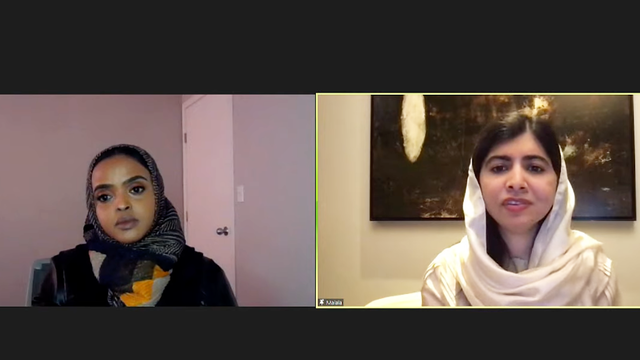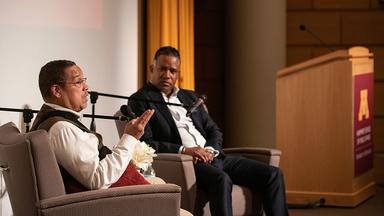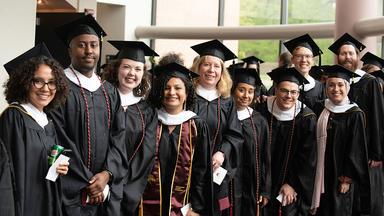From climate change to political upheaval to the COVID-19 pandemic, efforts to improve access for girls’ education around the world are being disrupted, according to Malala Yousafzai, Internationally known advocate for global education who spoke to a virtual audience Tuesday in an event sponsored by the Humphrey School of Public Affairs.
Malala, a Nobel Peace Prize recipient and co-founder and board member of the Malala Fund, discussed her ongoing campaign to promote girls’ education in the School’s Distinguished Carlson Lecture, attended by an online audience of nearly 5,000 people.
Malala, who grew up in Pakistan, was shot by the Taliban in 2012 at the age of 15 for speaking out publicly against the group’s attempts to prevent girls from going to school. She recovered in the United Kingdom and has lived there since.
The Distinguished Carlson Lecture Series is presented by the Humphrey School of Public Affairs with support from Carlson and the Carlson Family Foundation. Here are some excerpts from Malala’s conversation with moderator Faiza Mahamud, a reporter at the Star Tribune and a Humphrey School alumna. Her remarks have been edited for length and clarity.
On the scope of the problem:
When we talk about the 130 million girls who are out of school, we need to look at the many factors that are involved. The reasons include poverty, social norms, lack of investment, lack of infrastructure, lack of quality teachers. Everywhere I go, I meet incredible girls who are fully aware of the challenges that they are facing and they know that it is wrong. And they want to change that. And they know the only way they can change their society is through education.
On how climate change has affected access to education for girls worldwide:
Some of the research that has been conducted shows us that up to 12.5 million girls are at risk of losing their education by 2025 due to disasters like floods, extreme heat waves, and other climate-related events. When such disasters happen, girls are usually the first ones to drop out of school and then they are the last ones to return.
Schools are damaged due to climate-related events like floods. When there is a drought, families become refugees. They have to migrate from one area to another, and when they move to a new location, the girls and women are greatly impacted. They do not have access to job opportunities or education. And many of these girls are forced into marriages, because that way the family reduces the financial burden that they have to carry.
On the other hand, when we talk about how to tackle climate change, it turns out that girls’ education is also one of the best solutions. When girls are educated, they contribute toward finding solutions for climate change and they become part of the green economy that we need for our future.
On the impact of the pandemic on girls’ education:
Education has been impacted in almost every country. Many students missed at least a few months of school, and in some countries it has lasted a year or longer. At the start of this pandemic, Malala Fund started doing research on the impact of such pandemics on girls' education. It found that girls' education will be impacted.
There is a risk that 20 million girls will not be able to return to their schools because of this pandemic. Girls are limited to their homes and are not able to access their schools. They are more likely to be helping their families with household chores, and supporting their families financially. Some are also more likely to be pushed into early marriages [to ease the family’s financial burden.] The longer a girl remains out of school, the less likely she is to return to school.
On how to address educational inequity following the pandemic:
I think we need to talk about the new normal. The pandemic has exposed some of the weaknesses and vulnerabilities of the systems we have built.
One way to address this is through digital education. This has already been the case in so many countries, in many schools and universities. So I think this is something that could be explored for children all around the world. And it could also help us to fight some of the barriers to education. For example, for children in remote areas who have to walk two or three hours every morning to get to a school, they can have education available to them in their house through a digital device. But we also know that when it comes to accessibility, girls are less likely to have access to digital devices so we need to address the gender factor from the start.
On how to draw in men and boys to improve access to education for girls:
I am so lucky I have an amazing father and two younger brothers. So I ensure that they know how to be supportive brothers and supportive men. I think as much as it's about sharing information, it's also about showing them practical examples. My father shows what it means to be a feminist man.
I often give the example of how he celebrated my birth. Many family members visited my mom not to congratulate her, but to offer her comfort and prayers that she would have a son next time. My father was very proud to have a daughter. He named me Malala after an Afghan female hero, and he hoped that his daughter would have her own rights and that her name would not disappear from society like many other women's names.
He tells me how his cousin had worked on our family tree going back 300 years, and not a single woman was mentioned. We did have women but they were not recognized as part of the family bloodline. So my father wrote my name on that family tree. And he was doing all of this at a time when he had not heard the word ‘feminism.’
For men and boys, it's really important that they understand their role in this fight for equality. We know that when we create a more equal society, it will also benefit men and boys. One study by the Malala Fund shows that if all girls around the world are educated, it would add up to $30 trillion to the world economy. Imagine that. So men should be supporting women and girls and their education and their empowerment. It will not only benefit women and girls. but it will also improve our countries, our societies, our economies.
On advice for educators:
I think educators are such an important part of our society. They shape our future. I don't think I can educate educators, but I can say that they have such an important role to play. I am here because of my teachers who have challenged me, who have nurtured me, and who have educated me to not just consume information, but to have this heart for knowledge and understanding and critical thinking. And to ensure that I have a role to play in using it for the benefit and the advantage of our society and community. The people who believe the most in you often are your teachers, and we still remember their words to this day.
You, as educators, are creating the leaders of our future. You are creating the change makers. You are creating the people who are running the society of tomorrow. So thank you so much for all that you do.
On the return of Taliban rule in Afghanistan:
We can talk about the politics of [the U.S. withdrawal from Afghanistan] in the coming years, but what is really important right now is that we respond to the humanitarian urgency that is in Afghanistan. We know that 23 million people are at risk of starvation. It's become difficult and challenging for many of them.
For me I think it's really important that we fight for the rights of girls in Afghanistan to be protected. Afghanistan right now is the only country in the world where girls are denied their right to secondary education. The Taliban are using the same excuses they were using two decades ago, saying that it's not safe for girls to be in school, that they do not have enough female teachers, or that girls should be studying in a separate school than boys.
And the fear is that if we stop advocating for girls' education and for the protection of women's rights, and if no one talks about it, these challenges against women and girls will continue; that the Taliban will then ignore these issues.
All of a sudden, women have lost presence in Afghan society. They have lost presence in government, in the social sector, in the workforce. It's as if the women disappeared. In the past 20 years, many women in Afghanistan have received their education; they know what it means to be empowered and to be educated, and they cannot imagine a life without education.
It's so inspiring right now to see Afghan women protest on the streets against the discrimination that the Taliban are imposing. I'm inspired by the passion that Afghan girls hold for their education and their learning. And I stand with them.
About the Distinguished Carlson Lecture Series
For nearly four decades, the Humphrey School of Public Affairs, with support from Carlson and the Carlson Family Foundation, has presented the Distinguished Carlson Lecture Series, bringing to Minnesota world-renowned speakers to participate in a forum dedicated to the presentation and discussion of the most important policy issues of the day.
The series began in 1980 with a gift from Curtis L. Carlson to honor his late friend, Hubert H. Humphrey, and to “contribute to the intellectual life of the greater Twin Cities community by sponsoring lively forums of broad interest.”
Previous lecturers include Presidents Jimmy Carter, George H.W. Bush, and Bill Clinton, as well as Gloria Steinem, Jon Meacham, and His Holiness the 14th Dalai Lama. See the complete list here.


